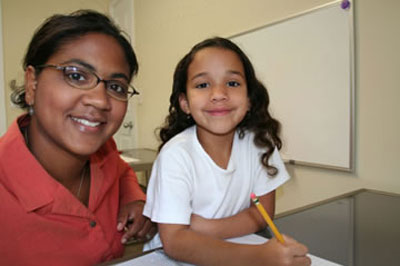Kara: So, Lupe, you moved to the United States when you were about eight, and you had to learn English because Spanish is your first language. What did you think about bilingual education in the United States?
卡拉:卢佩,你八岁的时候搬到美国生活,你的母语是西班牙语,所以你搬到美国后要学习英语。你认为美国的双语教育怎么样?
Lupe: You know coming in, I was really, really scared of not being able to communicate with other children and being able to fit in. But coming at a really young age like that, you realize that it's not as hard to learn the language and the school I happened to go to had a great bilingual program and they were actually helping us continue our Spanish speaking education and the reading and writing, which was great because I never wanted to lose that aspect of my life and a lot of kids had to do that because there are schools that don't have bilingual programs, so a lot of kids our born and raised speaking Spanish, but once they start school and they start learning English they really forget their Spanish, so it was really important for me to be able to learn the English language, but still be able to know the Spanish language and it's a great benefit because now in my job it really helps me to be bilingual and not only to speak both languages but to be able to read and write both because it's really important to be able to communicate with other people not only, you know, speaking but also in reading and writing.
卢佩:你知道,我搬到美国以后,曾经非常害怕和其他的孩子交流,我也无法很好的适应。不过在很小的年纪搬到美国的好处是,学习语言不会那么难,而且我念的那所学校拥有非常棒的双语教学体系,老师帮助我们继续西班牙语听说读写的学习,这点非常棒,因为我不想让这些在我的生活中消失,可是有很多孩子却必须这么做,因为有些学校没有双语教学体系,所以有很多出生后说西班牙语长大的孩子在美国上学,开始学习英语以后,都会忘了西班牙语怎么说,所以对我来说,既能学习英语又能继续学习西班牙语非常重要,而且这给我带来了很多好处,会说两种语言对我工作上的帮助很大,我不仅会说两种语言,而且能阅读两种语言也能用这两种语言写作,因为和其他人交流时,不仅仅是说,读写也非常重要。
Kara: Now, you've also taken classes in French in school. Do you think it has been easier learning French through a textbook or learning English being thrown into the United States and having to learn it?
卡拉:你在学校里还学过法语。你认为是通过教材学习法语更容易,还是在美国有语言环境的情况下学习英语更容易?
Lupe: I think learning a second language made it that much easier to jump in to a third language. You already sort of have a foundation of what it's like to start learning to speak a different language and communicate in a different language, but as you get older I definitely think it gets a little harder with pronunciation and different, you know, different aspects of the language and learning it, but I think it depends a lot on the teachers and the way they teach the language because I can read a textbook and try to understand what they are teaching but it's a lot easier when I have someone in front of me who knows the language, who can answer my questions and not only that: someone I can listen to and see the pronunciation and make sure that I'm doing it correctly.
卢佩:我认为学会第二种语言后再学第三种语言就容易多了。因为你已经有了基础,你已经知道如何开始学习其他语言,知道如何用另一种语言去交流,不过随着年龄的增长,在学习时会更难掌握发音和语言的其他方面,不过这很大程度上取决于老师和他们教学的方法,因为我可以看教材去理解他们教的内容,而如果我身边有一个懂这种语言的人会更利于学习,因为这个人可以解答我的疑问,而不仅仅是教我发音,确保我的发音正确而已。
Kara: Now, do you think it would be easier for you to learn French if you actually went to France and lived there?
卡拉:你认为如果你去法国生活,学习法语更容易一些?
Lupe: Definitely. I think being around other people that speak the language make it that much easier to learn the language and I think that's why I learned to speak English when I moved here so quickly because I was surrounded by people who primarily spoke English, so there were times when I had no choice but to try and speak it and it kind of forced me to give it a try even more when I was afraid because I had no other way to communicate, so I think being around others who speak and understand the language definitely makes it easier for you to understand it and learn it quicker.
卢佩:当然是。我认为旁边有说这种语言的人会让我更容易地学会这种语言,我搬到这里以后能很快地学会英语,就是因为我周围的人们都说英语,我没有别的选择,只能学着去说英语,虽然我有点害怕,但是我不得不去试,因为我没有其他方法来交流,所以我认为有语言环境的话,肯定会更容易去理解这种语言,也可以更快地学会。

译文属可可原创,仅供学习交流使用,未经许可请勿转载


